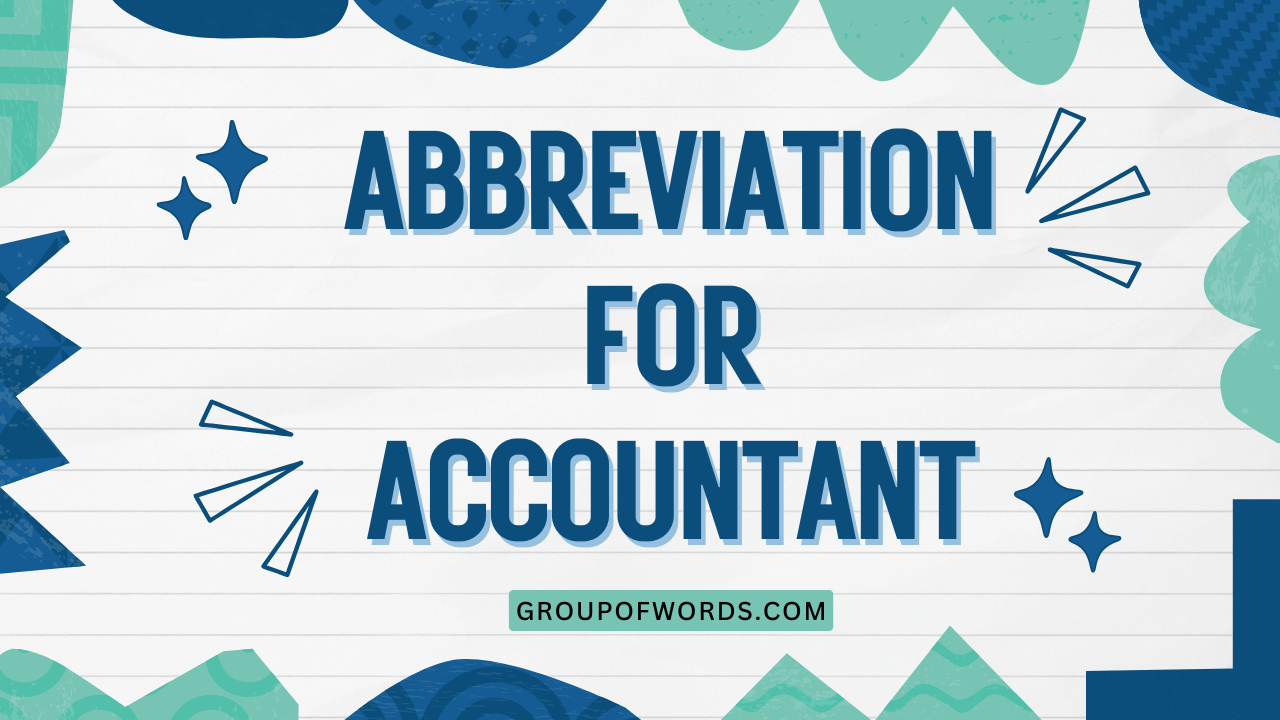Abbreviations for Accountant: A Comprehensive Guide
Understanding abbreviations is crucial in professional communication, especially in fields like accounting where precision and efficiency are paramount. Knowing the common abbreviations for “accountant” not only saves time but also enhances clarity in reports, emails, and other documents.
This comprehensive guide will explore the various abbreviations used for “accountant,” their contexts, and the rules governing their proper use. This article is beneficial for accounting students, professionals, and anyone who interacts with financial documents regularly.
Table of Contents
- Introduction
- Definition of Accountant and Abbreviation
- Structural Breakdown of Abbreviations
- Types of Abbreviations for Accountant
- Examples of Accountant Abbreviations in Use
- Usage Rules for Accountant Abbreviations
- Common Mistakes When Using Accountant Abbreviations
- Practice Exercises
- Advanced Topics: Contextual Usage
- Frequently Asked Questions (FAQ)
- Conclusion
Definition of Accountant and Abbreviation
An accountant is a professional who is skilled in the practice of accounting, which involves recording, classifying, summarizing, and interpreting financial data. Accountants provide a range of services, including preparing financial statements, managing taxes, conducting audits, and offering financial advice. They play a vital role in helping businesses and individuals make informed financial decisions.
An abbreviation is a shortened form of a word or phrase. Abbreviations are used to save space and time, especially in writing. They are common in professional fields where efficiency is valued. In the context of “accountant,” abbreviations are frequently used in business communications, professional titles, and formal documents.
Structural Breakdown of Abbreviations
Abbreviations are formed by shortening a word or phrase. They can be created in several ways:
- Truncation: Cutting off the end of a word (e.g., “Assoc.” for “Associate”).
- Contraction: Removing letters from the middle of a word (e.g., “Acct.” for “Account”).
- Acronym: Using the initial letters of a phrase to form a new word (e.g., “CPA” for “Certified Public Accountant”).
- Initialism: Using the initial letters of a phrase, pronounced letter by letter (e.g., “A.C.A.” for “Associate Chartered Accountant”).
Understanding these structural elements helps in recognizing and interpreting various abbreviations used for “accountant.” The choice of abbreviation often depends on the context and the specific professional title or certification being referenced.
Types of Abbreviations for Accountant
Several abbreviations are commonly used for “accountant” and related titles. These can be broadly categorized as:
General Abbreviations for Accountant
These are short forms used to represent the word “accountant” itself.
- Acct.: A common abbreviation for “Account.”
- Accnt.: Another variation for “Account.”
- A/C: Sometimes used in informal contexts, though less common for referring to a person.
Abbreviations for Professional Accounting Titles
These abbreviations represent specific certifications and titles held by accountants.
- CPA: Certified Public Accountant (US).
- CA: Chartered Accountant (UK, Canada, Australia, etc.).
- ACA: Associate Chartered Accountant (ICAEW – England and Wales).
- FCA: Fellow Chartered Accountant (ICAEW – England and Wales).
- CMA: Certified Management Accountant.
- CGMA: Chartered Global Management Accountant.
- ACCA: Association of Chartered Certified Accountants.
- CISA: Certified Information Systems Auditor.
- CIA: Certified Internal Auditor.
Abbreviations in Academic Contexts
These are used in educational settings or when referencing academic qualifications.
- B.Acc.: Bachelor of Accountancy.
- M.Acc.: Master of Accountancy.
- Ph.D. (Accounting): Doctor of Philosophy in Accounting.
Examples of Accountant Abbreviations in Use
The following tables provide examples of how these abbreviations are used in various contexts. Understanding these examples will help you recognize and use the abbreviations correctly.
Table 1: General Abbreviations for Accountant in Sentences
This table illustrates how the general abbreviations for “accountant” (Acct., Accnt.) are used in different sentences.
| Abbreviation | Example Sentence |
|---|---|
| Acct. | Please consult your Acct. for tax advice. |
| Acct. | The Acct. prepared the financial statements. |
| Acct. | Our company hired a new Acct. last month. |
| Acct. | The Acct. is responsible for managing the budget. |
| Acct. | I need to schedule a meeting with my Acct.. |
| Acct. | The audit was conducted by an external Acct.. |
| Acct. | The Acct. reviewed the expense reports carefully. |
| Acct. | Our Acct. recommended several cost-saving measures. |
| Acct. | The Acct. provided valuable insights into our financial performance. |
| Acct. | We rely on our Acct. for accurate financial reporting. |
| Accnt. | The Accnt. verified the accuracy of the invoices. |
| Accnt. | Our Accnt. is highly skilled in tax planning. |
| Accnt. | The Accnt. helped us navigate complex financial regulations. |
| Accnt. | We appreciate the expertise of our Accnt.. |
| Accnt. | The Accnt. provided a detailed analysis of our financial position. |
| Accnt. | The Accnt. ensured compliance with accounting standards. |
| Accnt. | Our Accnt. is always available to answer our questions. |
| Accnt. | The Accnt. played a key role in our company’s success. |
| Accnt. | We trust our Accnt. to handle our financial matters with integrity. |
| Accnt. | The Accnt. is a valuable asset to our team. |
Table 2: Professional Accounting Titles in Context
This table demonstrates how abbreviations for professional accounting titles (CPA, CA, CMA, etc.) are used to indicate specific qualifications.
| Abbreviation | Example Sentence |
|---|---|
| CPA | John Smith, CPA, is our lead auditor. |
| CPA | Only a licensed CPA can perform certain types of audits. |
| CPA | The firm employs several CPAs with expertise in various industries. |
| CPA | She became a CPA after passing the Uniform CPA Examination. |
| CPA | Our tax department is headed by a seasoned CPA. |
| CPA | The CPA certification is highly valued in the accounting profession. |
| CPA | Many companies prefer to hire CPAs for their financial reporting needs. |
| CPA | The CPA designation demonstrates a high level of competence and ethical standards. |
| CPA | We require all our senior accountants to obtain their CPA license. |
| CPA | The CPA exam is known for its rigor and comprehensiveness. |
| CA | Mary Jones, CA, is a partner at the accounting firm. |
| CA | As a CA, he is authorized to sign off on financial statements. |
| CA | The company’s finance director is a qualified CA. |
| CA | Becoming a CA requires extensive training and examinations. |
| CA | Our CA provided expert advice on international tax matters. |
| CA | The CA designation is recognized globally as a mark of excellence. |
| CA | Many CAs hold senior management positions in large corporations. |
| CA | The CA qualification ensures a high level of professional competence. |
| CA | We are proud to have several CAs on our team. |
| CA | The CA training program is designed to develop well-rounded accounting professionals. |
| CMA | David Lee, CMA, specializes in cost accounting. |
| CMA | A CMA is essential for effective financial management. |
| CMA | The CMA certification focuses on management accounting skills. |
| CMA | Our CMA helped us improve our budgeting processes. |
| CMA | She is a CMA with over 10 years of experience in the manufacturing industry. |
| CMA | The CMA exam covers a wide range of topics related to management accounting. |
| CMA | Many CMAs work in corporate finance and accounting roles. |
| CMA | The CMA designation is highly respected in the business community. |
| CMA | We encourage our employees to pursue the CMA certification. |
| CMA | The CMA program provides valuable skills for strategic decision-making. |
| CGMA | As a CGMA, she provides strategic financial guidance. |
| CGMA | The CGMA designation is globally recognized. |
| CGMA | He is a CGMA with extensive experience in international finance. |
| CGMA | The CGMA certification focuses on global management accounting standards. |
| CGMA | Our CGMA is responsible for overseeing our global financial operations. |
| CGMA | The CGMA program provides valuable insights into global business practices. |
| CGMA | Many CGMAs hold leadership positions in multinational corporations. |
| CGMA | The CGMA designation demonstrates a commitment to ethical and professional standards. |
| CGMA | We value the expertise of our CGMA in navigating complex financial challenges. |
| CGMA | The CGMA certification is a valuable asset for any management accounting professional. |
Table 3: Academic Abbreviations in Accounting
This table illustrates the use of academic abbreviations related to accounting degrees and qualifications.
| Abbreviation | Example Sentence |
|---|---|
| B.Acc. | She holds a B.Acc. from the University of Texas. |
| B.Acc. | A B.Acc. is often a prerequisite for CPA certification. |
| B.Acc. | He completed his B.Acc. with honors. |
| B.Acc. | The B.Acc. program provides a strong foundation in accounting principles. |
| B.Acc. | Many students pursue a B.Acc. to start their accounting careers. |
| B.Acc. | The B.Acc. curriculum includes courses in financial accounting, managerial accounting, and auditing. |
| B.Acc. | Our company prefers to hire graduates with a B.Acc. degree. |
| B.Acc. | The B.Acc. program prepares students for the CPA exam. |
| B.Acc. | Many B.Acc. graduates go on to work in public accounting firms. |
| B.Acc. | The B.Acc. degree is a valuable asset for a career in finance. |
| M.Acc. | He earned an M.Acc. to specialize in forensic accounting. |
| M.Acc. | An M.Acc. can enhance career prospects in accounting. |
| M.Acc. | She is currently pursuing her M.Acc. at Stanford University. |
| M.Acc. | The M.Acc. program offers advanced courses in accounting theory and practice. |
| M.Acc. | Many professionals with a M.Acc. work in senior management roles. |
| M.Acc. | The M.Acc. degree provides a deeper understanding of complex accounting issues. |
| M.Acc. | Our company encourages employees to pursue an M.Acc. to advance their careers. |
| M.Acc. | The M.Acc. program prepares students for leadership roles in the accounting profession. |
| M.Acc. | Many M.Acc. graduates go on to work as controllers and CFOs. |
| M.Acc. | The M.Acc. degree is highly valued by employers in the accounting industry. |
| Ph.D. (Accounting) | Dr. Smith holds a Ph.D. (Accounting) and teaches at Harvard. |
| Ph.D. (Accounting) | A Ph.D. (Accounting) is required for academic positions in accounting. |
| Ph.D. (Accounting) | He is a Ph.D. (Accounting) candidate researching tax policy. |
| Ph.D. (Accounting) | The Ph.D. (Accounting) program focuses on rigorous research and scholarly inquiry. |
| Ph.D. (Accounting) | Many professors in accounting departments hold a Ph.D. (Accounting). |
| Ph.D. (Accounting) | The Ph.D. (Accounting) degree is the highest academic qualification in the field of accounting. |
| Ph.D. (Accounting) | Our university has a renowned Ph.D. (Accounting) program. |
| Ph.D. (Accounting) | The Ph.D. (Accounting) program prepares students for careers as accounting professors and researchers. |
| Ph.D. (Accounting) | Many Ph.D. (Accounting) graduates go on to publish their research in top academic journals. |
| Ph.D. (Accounting) | The Ph.D. (Accounting) degree is a prerequisite for tenure-track positions at most universities. |
Usage Rules for Accountant Abbreviations
Using abbreviations correctly is essential for clear communication. Here are some rules to follow:
- Context Matters: Always consider the context. In formal documents, it’s best to spell out “accountant” on first mention and then use the abbreviation.
- Consistency: Be consistent within the same document or communication. Don’t switch between “Acct.” and “Accountant” randomly.
- Professional Titles: When using professional titles like CPA or CA, ensure the individual actually holds the certification. Misrepresenting someone’s credentials is unethical and potentially illegal.
- Clarity: If there’s a chance the abbreviation might be unclear, define it the first time you use it (e.g., “Certified Public Accountant (CPA)”).
- Punctuation: Follow standard punctuation rules. Most abbreviations use periods (e.g., “Acct.”), but some, like CPA and CA, do not.
Common Mistakes When Using Accountant Abbreviations
Several common mistakes can occur when using abbreviations for “accountant.” Here are some examples to avoid:
| Incorrect | Correct | Explanation |
|---|---|---|
| He is a cert. public accountant. | He is a Certified Public Accountant (CPA). | Spelling out the full title on first mention or using the correct abbreviation (CPA) is better. |
| She is an acct. | She is an accountant. | In general writing, it’s preferable to spell out “accountant” unless space is limited. |
| John, CA, will audit. | John, CA, will conduct the audit. | Using strong verbs. |
| My accnt is the best. | My accountant is the best. | Avoid using abbreviations in casual conversation unless both parties understand them. |
| The CPA will look at the books. | The CPA will review the financial records. | “Financial records” is more professional than “the books”. |
Practice Exercises
Test your understanding of accountant abbreviations with these exercises.
Exercise 1: Abbreviation Identification
Identify the meaning of each abbreviation.
| Question | Answer |
|---|---|
| What does CPA stand for? | Certified Public Accountant |
| What does CA stand for? | Chartered Accountant |
| What does ACA stand for? | Associate Chartered Accountant |
| What does CMA stand for? | Certified Management Accountant |
| What does B.Acc. stand for? | Bachelor of Accountancy |
| What does M.Acc. stand for? | Master of Accountancy |
| What does CGMA stand for? | Chartered Global Management Accountant |
| What does Acct. stand for? | Accountant |
| What does ACCA stand for? | Association of Chartered Certified Accountants |
| What does FCA stand for? | Fellow Chartered Accountant |
Exercise 2: Sentence Completion
Complete the sentences using the correct abbreviation.
| Question | Answer |
|---|---|
| Jane Doe, ____, is a tax specialist. | CPA |
| He holds a ____ in accounting from a reputable university. | B.Acc. |
| Our company hired a new ____ to manage our finances. | Acct. |
| She is a ____ with extensive experience in cost management. | CMA |
| As a ____, he is authorized to sign off on financial statements. | CA |
| He earned an ____ to specialize in forensic accounting. | M.Acc. |
| She is a ____ with over 15 years of experience. | ACCA |
| Dr. Smith holds a ____ in accounting and teaches at a university. | Ph.D. (Accounting) |
| Our ____ helped us improve our budgeting processes. | CMA |
| He is a ____ with expertise in international finance. | CGMA |
Exercise 3: Error Correction
Identify and correct the errors in the following sentences.
| Incorrect Sentence | Correct Sentence |
|---|---|
| He is a cert public accountant. | He is a Certified Public Accountant (CPA). |
| She is an acct and good at tax. | She is an accountant and good at tax. |
| John CA will audit the books. | John, CA, will conduct the audit of the financial records. |
| My accnt is really good. | My accountant is very skilled. |
| Only CPAs can do that audit. | Only CPAs are authorized to perform that type of audit. |
| The accnt. gave good advice. | The accountant gave valuable advice. |
| She has a b.acc degree. | She has a B.Acc. degree. |
| He is the best acct in town. | He is the best accountant in town. |
| The cma certification is valuable. | The CMA certification is highly valued. |
| I need to speak to my acct asap. | I need to speak to my accountant as soon as possible. |
Advanced Topics: Contextual Usage
Advanced learners should understand the nuanced use of abbreviations in specific contexts. For example, in international accounting, different countries may use different abbreviations for similar qualifications.
A “CA” in the UK has a slightly different scope of practice than a “CA” in Canada. Similarly, the specific requirements for obtaining a CPA license vary from state to state in the US.
Furthermore, understanding the specific industries and roles in which different accounting certifications are most valued is crucial. A CMA, for instance, is often more valued in corporate settings focused on management accounting, while a CPA is often preferred in public accounting firms offering auditing and tax services.
Understanding these contextual nuances enhances professional communication and decision-making.
Frequently Asked Questions (FAQ)
Here are some frequently asked questions about abbreviations for “accountant.”
- Is it always necessary to use a period in abbreviations like “Acct.”?
While it is common to use a period after abbreviations like “Acct.”, it is not always strictly necessary, especially in informal contexts. However, in formal writing, it is generally recommended to include the period for clarity and consistency.
- Can I use “A/C” as an abbreviation for “accountant”?
While “A/C” is sometimes used informally, it is more commonly understood as an abbreviation for “account” (as in a financial account) or “air conditioning.” It is best to avoid using “A/C” as an abbreviation for “accountant” to prevent confusion.
- What is the difference between a CPA and a CA?
A CPA (Certified Public Accountant) is a professional accounting certification primarily used in the United States. A CA (Chartered Accountant) is a similar certification used in the United Kingdom, Canada, Australia, and other countries. While both certifications denote highly qualified accountants, the specific requirements and regulatory frameworks differ by country.
- Is a CMA as valuable as a CPA?
The value of a CMA (Certified Management Accountant) versus a CPA (Certified Public Accountant) depends on the specific career path. CPAs are generally more focused on public accounting, auditing, and tax services, while CMAs are more focused on management accounting, financial planning, and analysis within organizations. Both certifications are highly valuable in their respective domains.
- How do I become a CPA?
To become a CPA in the United States, you typically need to meet specific educational requirements (usually a bachelor’s degree with a certain number of accounting credit hours), pass the Uniform CPA Examination, and fulfill work experience requirements under the supervision of a licensed CPA. The specific requirements vary by state.
- What are the benefits of obtaining a professional accounting certification like CPA or CA?
Obtaining a professional accounting certification like CPA or CA can significantly enhance career prospects, increase earning potential, and demonstrate a high level of competence and ethical standards. These certifications often open doors to leadership positions and specialized roles in the accounting profession.
- Are there continuing education requirements for CPAs and CAs?
Yes, both CPAs and CAs are typically required to complete continuing professional education (CPE) or continuing professional development (CPD) hours on an ongoing basis to maintain their certifications. This ensures that they stay up-to-date with the latest accounting standards, regulations, and best practices.
- Where can I find more information about accounting certifications and abbreviations?
You can find more information about accounting certifications and abbreviations on the websites of professional accounting organizations such as the American Institute of Certified Public Accountants (AICPA), the Institute of Chartered Accountants in England and Wales (ICAEW), and the Institute of Management Accountants (IMA).
Conclusion
Mastering abbreviations for “accountant” is a valuable skill for effective communication in the accounting profession. Understanding the different types of abbreviations, their proper usage, and common mistakes to avoid will enhance your professionalism and clarity.
By following the guidelines and practicing the exercises in this guide, you can confidently use accountant abbreviations in various contexts. Remember the importance of context, consistency, and clarity when using these abbreviations.
Always prioritize clear and accurate communication to avoid misunderstandings.






